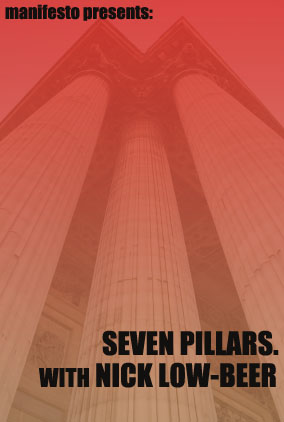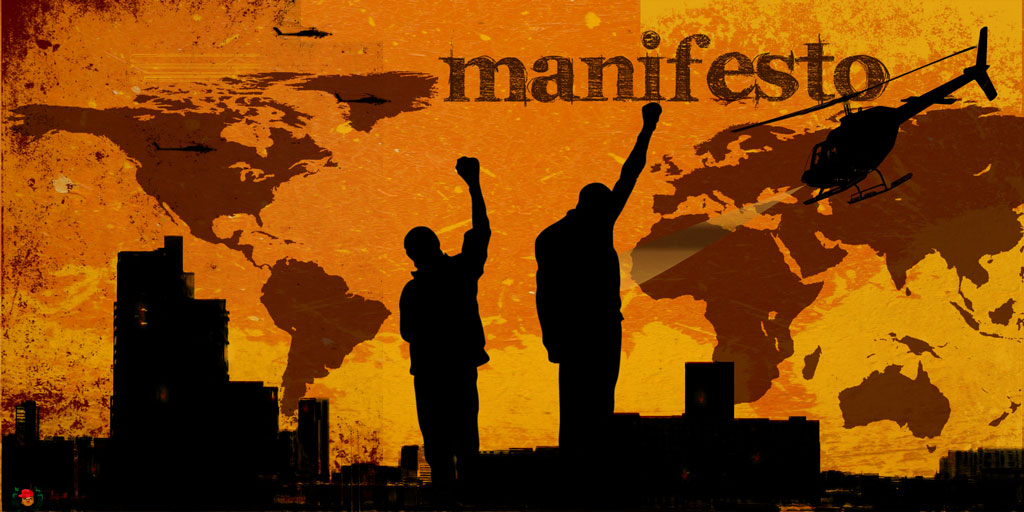Manifesto Presents: Seven Pillars - An Interview with Nick Low-Beer
 Thursday, December 15, 2011 at 9:40AM
Thursday, December 15, 2011 at 9:40AM 
In this edition of Seven Pillars, Chris “Preach” Smith speaks with Nick
Low-Beer, aka 81Neutronz, about his career as a DJ, musician and
producer. His career to date can be considered highly kinetic with
influences in hip hop and electronica both. Most notably, he collaborated
to make ‘Cinderella Man’ from Eminem’s ‘Recovery’ album in 2010 in
addition to working with established musicians from the UK electronica
scene.
Preach:What drew you to beat production? How did you realize that’s what you wanted
to do for a career?
NLB: Music’s always been a real kinetic thing for me. I started out with breaking,
breakdancing. Growing up, I was always trying to break from a very young
age. I had amassed a huge collection of tapes, and then my sister’s boyfriend
at the time was a DJ from the UK, Alex Patterson who spins a lot of ambient
house music, he noticed all these tapes and CD’s I had and was like, ‘Man,
this kid needs to start DJ’ing.’ So when I turned 13, he actually got me two
Technics and a mixer for my birthday and from then on, I was trying all kinds
of DJ tricks, playing parties, trying to battle and work on transforms and stuff
like that. So all throughout junior high, high school I was studying music, trying
to finding good music, stuff that would get people moving, studying pop music.
You know, those were the days when you had Belly, The Lox, Ruff Ryders…
that was when everything had to be hard. I spun dancehall as well. Then also,
the house scene, I can tell you when I went to get house records, I ‘d be buying
a lot of German and UK trance records because I liked the melodies better
and people weren’t really into that. People really wanted something like tribal
house, which was influenced by the Italian scene, and which was the norm
while I was in high school. When I went record shopping, people would give
shit like, ‘why are you buying all of these import records’ and I would say, ‘this
is what I like.’ Then my friend, who used to rap, he was big on the site
UndergroundHipHop.com, he got a Korg Triton. This was about 2001, that was
my first experience making beats by fooling around with his Triton. Then I got
a Triton and an MPC, and started making beats by myself. I went to college
at Colorado State University and over the course of college it became less
about DJing for me and more about making beats from scratch. That’s what
made me want to dance more, making my own music gave me that real feeling
just playing other people’s music didn’t give me. It kind of evolved from that
feeling of wanting to dance to my own music, that’s where it all came from.
Preach: How would you describe your particular sound to a first-time listener?
NL: I would say it’s a lot of bright colors, and a lot of big drums. I’m not really big on
subtlety. Very atmospheric. Somewhat cinematic. Some people have said,
“Oh this would be good on a movie soundtrack, like at the beginning of a
movie.” Something like that. Nick Low-Beer.
Nick Low-Beer.
Preach: One of your better known credits is as a co-producer for Eminem’s ‘Cinderella
Man.” How did that come about?
NL: The way that happened was, I was assisting my mentor, Phil Pitts. He made
some beats for 50 Cent, he did ‘Hands Up’ for Lloyd Banks, Between 2005
and 2007, he was pretty much looking over my shoulder, guiding me, drilling
into me the need for fundamentals. I was in the studio working with him. This
time around, he was working in the studio with someone else while the next
person scheduled to work with him sat with me This guy, Script Shepard
wrote the record himself and he approached me saying, ‘Yo I have this sound idea,
I’d like someone to make a beat for it. Do you think you can make a beat for this song?
And I said, ‘Sure, I’ll try, what do you want?’ He sang the hook and basically
wanted a sound like (Queen’s) ‘We Will Rock You’. And I’m sitting there and
listening to it, thinking it’s cool, not really realizing it’s a $50,000 record. So,
in about 5 minutes we had the beat. I layered feeds, some kicks and snares,
shit I had chopped up from a couple of movies. Shepard took the track, and 3
years later, he calls me up and told me, ‘Yo Eminem wants the track.’ I didn’t
really jump on it, because after working in New York City a couple of years,
you begin to hear a lot of people tell you stuff like that. ‘Yo, I got you’ and other
stuff. So I said, “Okay, I’ll get to it when I get to it’ because I had just left the disc
with the file at my parents’ house in Connecticut. He got at me like, ‘Yo, what
don’t you understand about Eminem wants the file?!!!” and my response was,
“All right, what do I get?” He says, “Well next time we set up we’ll call you.” I’m
like, “Well that’s not good enough. I made the whole track, what are you talking
about?” He goes, “Man, you didn’t do nothing! Any engineer could’ve done
what you did!!” So I go, “Oh word? Well then why don’t you get another
engineer then?!” He tells me, ‘We already tried that, we brought in another guy
to sit in and they didn’t want that beat, they wanted the one you did in five
minutes.” So it was super ugly for a second. Script is super cool, but I think the
pressure of the situation got to everybody. I got super defensive, which made
him get mad aggressive about it being his even though when we were working
on it, it was all for the love at the time. Which is the nature of the industry I think;
on one hand it can be so cool , all cool but when people start talking about
fame and money, everybody gets defensive. Luckily for me that year, everyone was
coming to me with requests for that file from that situation. If they hadn’t come at
me so crazy, I wouldn’t have been able to barter a good position. I was lucky
that my mind allowed me not to rush. I said to myself, ‘even if this does get
placed, I don’t feel like giving up this file unless I get what I deserve.’r. Script
ended up getting production, I ended up getting drum programming and a
small percentage of the buyout price of the record, which was cool. I got my
name on a small credit on the biggest record of the year. I was happy with that.
Then the universe somehow saw my name placed as a feature on the record
on the listing of the record on Best Buy’s website, which I think is hilarious. But
that’s how it happened, it happened quickly, the beat took five minutes to make
from start to finish.
Preach: How did you link up with Blaklionz Beats?
NL: He (Rajahru) hit me up on Facebook,, told me he had heard some of my music and was
interested in working together. I was all for it. I’m like, ‘Cool let’s arrange a face
to face meeting.” We struggled to make that happen for a couple of months but
when we finally got up, it was real cool. For me, face to face meetings are good
because I have to see if I connect with you enough to work with you. And I got
the sense that Rajah was a good dude, and he had a lot of things going on.
The connection I believe was also due to this dude Gaji, who’s from Montserrat
and also Bruk Up, who I know who’s very well-known in the dancehall scene.
Preach: A lot of producers out there have gone the route of releasing beat tapes and
instrumental EPs. Do you see yourself doing that, if you haven’t done so already?
NL: Yeah, sure. Most of my music I pretty much release on my website. I’m not
opposed to it. I know that recently it worked good for someone who went on
to produce ASAP Rocky after a couple of beat tapes. For me, I have one foot
in electronic music and one foot in hip hop. I’m trying to spread the music I
have however I can. I’m more of a behind the scenes kind of person, and I’m
not that great at promoting myself. So I’m thankful that I met Raj ‘cause he
really likes my sound, independent of the credit, he really believes in it so
he’d be able to help me out with that. If he were to say, “Hey I think we should
do a beat CD, here’s an idea for the artwork, and so on’ I’d definitely be down
to do it.
Preach: With that, is there anything new you’re planning to work on?
NL: I’m trying to get an electronic music distribution deal with this label, and I’m
putting together an album. Something like the soundtrack to a movie that hasn’t
existed yet. I want the beats to be continuous, to morph into each other, kind of
like how Saigon’s album was with its beats. I’m also just releasing beats one
by one through my website, and finding more spots that want someone to
come out and play more electronic music, to do more DJing than I used to.
Preach: What words of advice would you give to someone just starting our in music
production?
NL: One of the most important things you can do is to find a mentor. Find somebody
who can be a sonic example to you and drill you in the fundamentals. Having a
mentor can be a BIG difference. For me, having the mentor that I had at
Bangout was an invaluable experience because the way that I made beats
before I met him and the way that I made beats after was totally different. It’s a
combination of having a good mentor and studying the fundamentals of what
music you’re into. If you can’t find inspiration, listen to more music. For people
starting out in the music industry, people always want to know how to get on.
People should know how to cultivate. Read, Study good music. Meditate. That’s
the secret of life. Because no matter how bad your music is, if you sign the
wrong deal, you could be put on tomorrow. Because someone is there who is
willing to exploit you, make a fool of you and put you up there next to Kim
Kardashian on the E! Channel if you’re willing to sell yourself out like that. But
people don’t really want to be on like that, people want to be on, on their terms.
They want to spread what it is they have to offer musically and I feel in order to
do that, it’s a much longer road. It’s a road of faith. You gotta believe in what you
do, you gotta refuse to sell out. I continually check myself. Because you’re only
as big as your next thing. Help others out, teach younger kids who are into
music about the fundamentals of engineering, do local parties. I’m a big
believer in schooling, as well as real world experience. Learn your emotions;
there’s kids who want to be put on and will walk out of a meeting with Jay-Z
because someone told them to shut up for a second and that was only done to
test them as to how they handle things.
For more of Nick’s music, check him out here: http://81neutronz.com/


